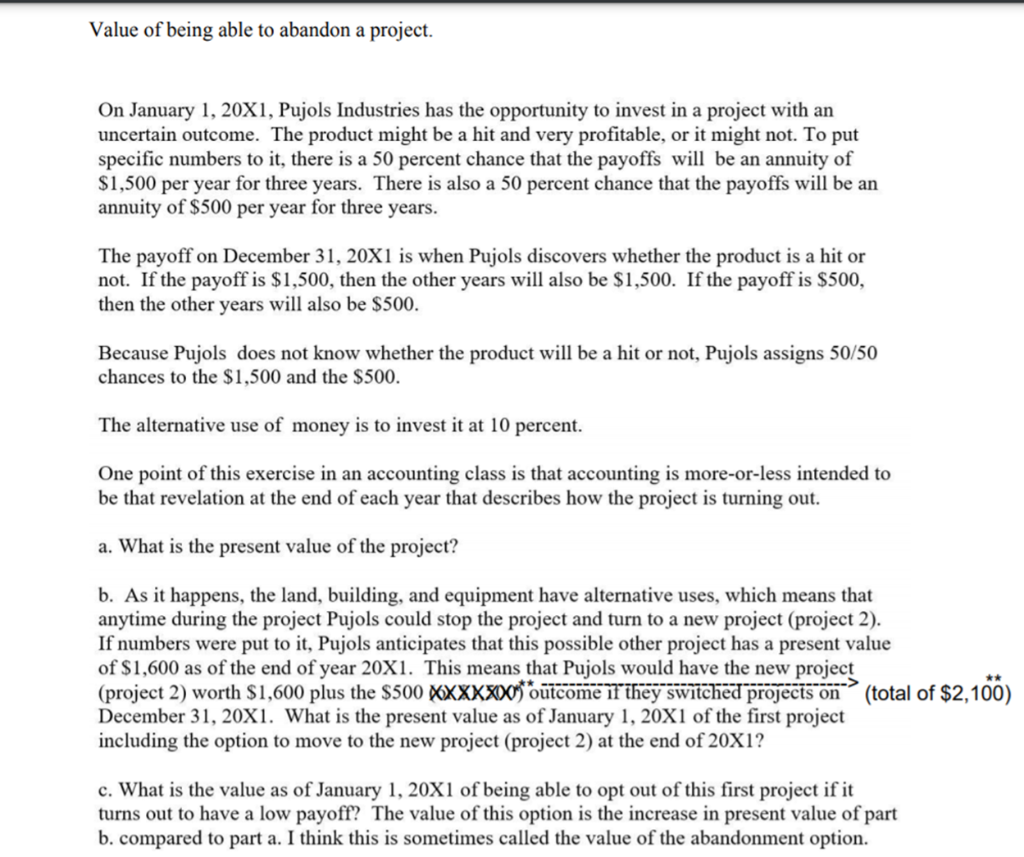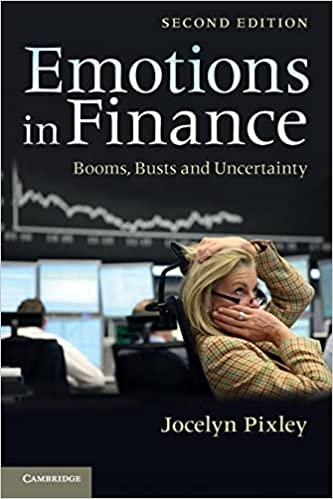
Value of being able to abandon a project. On January 1, 20X1, Pujols Industries has the opportunity to invest in a project with an uncertain outcome. The product might be a hit and very profitable, or it might not. To put specific numbers to it, there is a 50 percent chance that the payoffs will be an annuity of $1,500 per year for three years. There is also a 50 percent chance that the payoffs will be an annuity of $500 per year for three years. The payoff on December 31, 20X1 is when Pujols discovers whether the product is a hit or not. If the payoff is $1,500, then the other years will also be $1,500. If the payoff is $500, then the other years will also be $500. Because Pujols does not know whether the product will be a hit or not, Pujols assigns 50/50 chances to the $1,500 and the $500. The alternative use of money is to invest it at 10 percent. One point of this exercise in an accounting class is that accounting is more-or-less intended to be that revelation at the end of each year that describes how the project is turning out. a. What is the present value of the project? b. As it happens, the land, building, and equipment have alternative uses, which means that anytime during the project Pujols could stop the project and turn to a new project (project 2). If numbers were put to it, Pujols anticipates that this possible other project has a present value of $1,600 as of the end of year 20X1. This means that Pujols would have the new project (project 2) worth $1,600 plus the $500 XXXKX00*outcome if they switched projects on"> (total of $2,100) December 31, 20X1. What is the present value as of January 1, 20X1 of the first project including the option to move to the new project (project 2) at the end of 20X1? c. What is the value as of January 1, 20X1 of being able to opt out of this first project if it turns out to have a low payoff? The value of this option is the increase in present value of part b. compared to part a. I think this is sometimes called the value of the abandonment option. Value of being able to abandon a project. On January 1, 20X1, Pujols Industries has the opportunity to invest in a project with an uncertain outcome. The product might be a hit and very profitable, or it might not. To put specific numbers to it, there is a 50 percent chance that the payoffs will be an annuity of $1,500 per year for three years. There is also a 50 percent chance that the payoffs will be an annuity of $500 per year for three years. The payoff on December 31, 20X1 is when Pujols discovers whether the product is a hit or not. If the payoff is $1,500, then the other years will also be $1,500. If the payoff is $500, then the other years will also be $500. Because Pujols does not know whether the product will be a hit or not, Pujols assigns 50/50 chances to the $1,500 and the $500. The alternative use of money is to invest it at 10 percent. One point of this exercise in an accounting class is that accounting is more-or-less intended to be that revelation at the end of each year that describes how the project is turning out. a. What is the present value of the project? b. As it happens, the land, building, and equipment have alternative uses, which means that anytime during the project Pujols could stop the project and turn to a new project (project 2). If numbers were put to it, Pujols anticipates that this possible other project has a present value of $1,600 as of the end of year 20X1. This means that Pujols would have the new project (project 2) worth $1,600 plus the $500 XXXKX00*outcome if they switched projects on"> (total of $2,100) December 31, 20X1. What is the present value as of January 1, 20X1 of the first project including the option to move to the new project (project 2) at the end of 20X1? c. What is the value as of January 1, 20X1 of being able to opt out of this first project if it turns out to have a low payoff? The value of this option is the increase in present value of part b. compared to part a. I think this is sometimes called the value of the abandonment option







